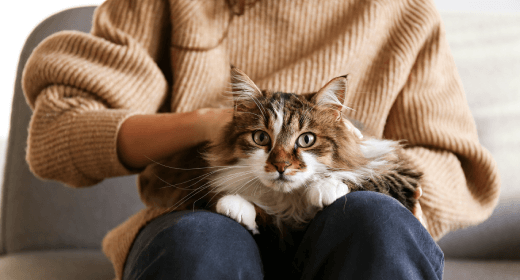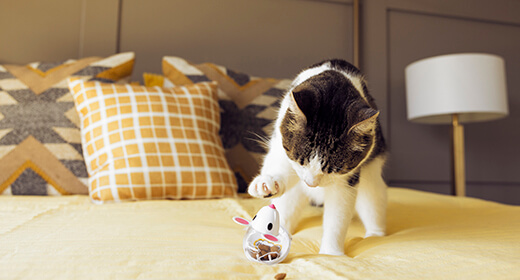

If you have ever indulged in a delicious piece of roasted chicken and noticed your furry friend giving you those irresistibly adorable, pleading eyes, you have probably wondered, 'Can cats eat chicken?'.
Chicken is a good source of protein, and you will find it as an ingredient in many commercial cat foods. However, there are some guidelines to follow. In this blog, we will uncover the delicious details about whether chicken is a friend or foe to our beloved furballs.
Is chicken good for cats? Well, when it comes to feline nutrition, chicken is often regarded as a favorite among our furry companions. Cats are obligate carnivores, which means that animal protein is essential for their overall health. Chicken, a lean and readily available source of protein, can offer several health benefits to your feline friend:
Chicken is a superb source of high-quality animal protein, which is essential for your cat's muscle development, growth, and overall body maintenance. Protein aids in tissue repair and supports a healthy coat.
Chicken is rich in essential amino acids, such as taurine, which is vital for cats. Additionally, taurine deficiency can lead to severe health issues, including heart problems and vision impairments.
Chicken contains essential vitamins and minerals like vitamin B6, niacin, phosphorus, and selenium. These nutrients contribute to your cat's overall well-being and help maintain a strong immune system.
Chicken has a naturally high moisture content, which can help keep your cat hydrated, especially if they are reluctant to drink water. Proper hydration is crucial for kidney health.
Most cats find chicken incredibly tasty, making it an excellent option for enticing picky eaters or cats with a diminished appetite.
While chicken can provide numerous health benefits to your cat, it should always be offered in moderation and as part of a balanced diet. Consult your veterinarian for guidance on the appropriate portion sizes and to ensure that chicken complements your cat's dietary needs.
If you have ever wondered whether it is safe to feed your cat raw chicken, be aware that it poses significant risks. Raw chicken, like other raw meats, can be contaminated with harmful. These pathogens can lead to severe gastrointestinal issues, including vomiting, diarrhoea, and even food poisoning in both cats and humans.
Additionally, when feeding your cat raw chicken increases the risk of nutrient imbalances and deficiencies, as it may lack essential nutrients that are destroyed during cooking.
To ensure your cat's safety, it is best to cook chicken thoroughly. Cooked chicken eliminates the risk of bacterial contamination and provides a safer and more digestible option for your feline friend.
Chicken bones, especially small and brittle ones like those in wings or drumsticks, can pose serious health risks to cats. Unlike dogs, cats have a more delicate digestive system and cannot process bones safely. When cats chew on or swallow bones, they can:
Small bones can get logged in a cat's throat, causing choking, gagging, or even airway obstruction.
Chicken bones can splinter into sharp pieces, which may damage a cat's mouth, throat, or digestive tract.
Bone fragments can create blockages in the gastrointestinal tract, leading to painful and life-threatening conditions.
Sharp bone fragments can puncture a cat's intestines or stomach, causing internal injuries and infections.
To keep your cat safe, always remove bones from chicken before offering it to them. Offer boneless, cooked chicken as an occasional treat, but ensure that it is free of seasonings, spices, and any potentially harmful ingredients.
Cats are known for their carnivorous cravings, but before you toss that raw chicken their way, hold your whiskers! While it might seem like a natural choice, there are some serious risks involved. Let's take a bite-sized look at what you need to know.
Raw chicken can be a breeding ground for nasty characters like Salmonella and Campylobacter. These troublemakers can cause a real bellyache for both your cat and you. Even if your feline friend does not show symptoms, they could pass these pathogens along to you, especially if you have got a delicate immune system. A real 'no-thank-you' dish!
Cooked or uncooked chicken bones can splinter into shards of trouble. These bone bits can wreak havoc on your cat's insides, causing choking, punctures, or blockages. To stay on the safe side, opt for boneless chicken or consider a vet-approved alternative.
Chicken is a protein powerhouse, but it is not the only game in town. Feeding your cat only raw chicken could lead to a dietary disaster. It is missing some crucial nutrients that your feline friend needs for a balanced diet. To keep their tails wagging, consult with a vet or feline nutrition guru to whip up a menu that is both tasty and nutritious.
When it comes to preparing raw chicken for your feline companion, a few key considerations can make all the difference in ensuring a safe and healthy meal:
Freshness is paramount. Check the sell-by date, and inspect the chicken for any signs of spoilage, such as an unusual odour or discoloration. Cats, like us, prefer their meals fresh and free from any hints of spoilage.
Handle raw chicken with care. Ensure your cutting board, knives, and utensils are clean and sanitized to prevent cross-contamination. Keeping a dedicated cutting board for cat food prep can help maintain hygiene.
Rinse the chicken thoroughly under cold water to remove any debris and pat it dry with a clean paper towel. This step helps minimize the risk of bacterial contamination, keeping your cat's meal safe and healthy.
While chicken can offer benefits to cats, it is important to remember a few key points. Always opt for cooked, boneless chicken in moderation, as raw chicken carries health risks due to bacterial contamination and nutrient imbalances. Furthermore, never offer chicken bones to cats, as they can be harmful.
Prioritizing freshness and maintaining proper hygiene when preparing chicken for your cat is essential to ensure its safety and well-being. If you have any doubts or need guidance, consulting a veterinarian or a nutrition expert can help you provide a balanced and secure diet for your feline friend. Moreover, to avoid any safety and dietary concerns, why not go for IAMS cat food? With chicken as the first ingredient, our range of cat food is developed to meet your cat’s day-to-day nutrition quota.
Yes, it is generally safe to feed your cat cooked chicken as long as it is plain, unseasoned, and boneless. Avoid using any spices, herbs, or cooking oils that might be harmful to cats.
Kittens can eat chicken, but it should be cooked and cut into small, manageable pieces. Ensure it is boneless to prevent choking hazards, and it can be a part of a balanced kitten diet.
Boiled chicken for cats is a nutritious and easily digestible option, especially if they have digestive issues. However, it should still be boneless and served plain without any seasonings or additives.
Yes, cats can eat chicken hearts and liver in moderation. These organ meats are a good source of essential nutrients for cats. However, they should be cooked and fed as part of a balanced diet rather than as the sole food source to avoid nutritional imbalances.


You've just got a new, adorable kitten, and its curiosity and playful nature fill your home with joy. However, one fine day, you notice that your little feline friend is a bit off its game. It seems to be in discomfort and eats barely anything. Moreover, you haven't seen anything in its litter box for a while. Could it be kitten constipation?
Just like in humans, kitten constipation is a condition where your kitten might find it difficult to have a bowel movement. In some cases, this discomfort can be severe and life-threatening, especially if left untreated for more than 48 hours.
While different kittens may present different symptoms, here are some commonly observed kitten constipation symptoms:
Lack of feces production: If your kitten hasn't produced any feces for 24-48 hours, it may be a sign of constipation.
Straining to defecate: Your kitten seems to be struggling in the litter box but produces nothing or very small, hard pieces of feces.
Loss of appetite: Your kitten isn't eating as much as it used to.
Lethargy: The usually playful and curious kitten is spending more time sleeping and seems less interested in activities.
Bloating or vomiting: If your kitten's tummy seems bloated, or it is vomiting, it could be due to constipation.
Kitten constipation can occur due to a variety of factors, such as:
Dehydration: Just like in humans, lack of sufficient water intake can lead to constipation in kittens.
Ingestion of indigestible items: Kittens love to play, but if they end up swallowing items like ribbons or hair ties, it could lead to a blockage in their digestive system.
Lack of defecation stimulation: Unweaned kittens require stimulation to defecate. If this isn't done, they might get constipated.
Intestinal parasites: Heavy parasitic infections in the intestines can also cause constipation.
Neurological or other diseases: Certain neurological conditions or diseases affecting the hindquarters can lead to constipation in kittens.
Now that we've covered what kitten constipation is, let's dive into how we can help our little furry pals.
In a case where your kitten is still active and eating, some home remedies can help alleviate their discomfort. However, if the kitten constipation symptoms persist, or if your kitten becomes less active and stops eating, it's time to seek veterinary assistance.
At the vet, treatments may include fluid injections, enemas, or x-rays to check for blockages. In severe cases, the vet may perform procedures to manually remove the blocked feces or even surgery.
Your kitten's health and comfort are paramount. If you spot the initial signs of constipation, there are some home remedies you can try before visiting the vet:
Keep your kitten hydrated: Hydration is crucial in preventing constipation. Make sure your kitten always has access to fresh water. If your kitten is fond of dry food, consider adding some water to it to increase their fluid intake.
Add fiber to your kitten's diet: A little bit of fiber can work wonders for constipation. Consider adding a spoonful of canned pumpkin (not pumpkin pie mix) to your kitten's food for a kitten constipation remedy. Moreover, you can incorporate IAMS Proactive Health Mother and Kitten food in your pet’s day-to-day meals to ensure sufficient fiber intake. This kitten food also contains FOS natural prebiotic to improve gut health and digestion.
Get your kitten moving: Just like in humans, physical activity can help stimulate bowel movements in kittens. Engage your kitten in fun, physical activities to keep them active.
Continue observing your kitten: Monitor your kitten closely. If the symptoms worsen or persist for more than a day, it's time to call the vet.
Recovery from kitten constipation is generally swift once the obstruction is removed, but it's crucial to address the underlying cause to prevent recurrence. Follow your vet's instructions to the letter, which may include finishing a prescribed medication course and maintaining regular deworming and fecal checks.
Remember, our adorable little kittens rely on us for their well-being. Being proactive in understanding kitten constipation symptoms and causes can help ensure your kitten stays happy, healthy, and ready to explore the exciting world around them.
Don't hesitate to reach out to a vet if you're unsure. With a little love, care, and the right kitten constipation remedy, your kitten will be back to their playful, cuddly self in no time.